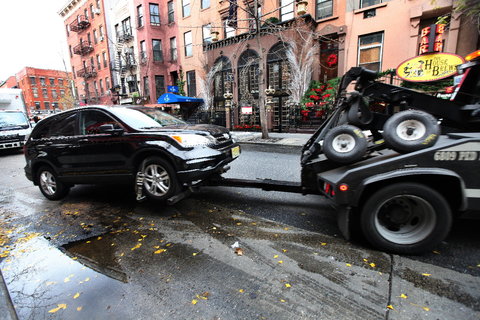 Chang W. Lee/The New York Times A car being towed in New York City.
Chang W. Lee/The New York Times A car being towed in New York City.
When we were looking for a home in a new city a few years ago, my family took a welcome break from house hunting to eat dinner.
We emerged from the restaurant just in time to see our car speed by — on the back of a tow truck. Apparently, we had mistakenly entered the incorrect parking space number in an automatic payment machine. We had paid — for the wrong space. So an alert local towing firm had pounced.
Our little adventure ended an hour or so later, after we tracked down the location of the tow lot and retrieved our car. The tow operator didn’t want to hear our argument about having paid for the wrong space, and the children were cranky, so we just paid the fee and went on our way.
But things didn’t go so easily for Robert Pelkey of Manchester, N.H., who sued a towing firm after it hauled away his car and then sold it, even though his lawyer told the towing firm he hadn’t abandoned it and wanted it back.
The towing firm invoked a federal transportation law to argue that his claim under a New Hampshire consumer law was invalid. The towing suit made it all the way to the United States Supreme Court, which this week found in Mr. Pelkey’s favor.
Here’s Mr. Pelkey’s tale of towing woe. In February 2007, a firm called Dan’s City Used Cars towed Mr. Pelkey’s 2004 Honda Civic from its parking spot because he had failed to move it during a snowstorm, per the policy of his apartment complex.
It turned out that Mr. Pelkey was ill, and ended up in the hospital to have his foot amputated shortly after the car was towed. He suffered a heart attack while in the hospital, and stayed there for nearly two months, according to a brief filed by his lawyers.
A notification mailed by Dan’s City to Mr. Pelkey was returned, according to the court’s opinion, so the firm scheduled the car for auction. When Mr. Pelkey did return home and found that his car was gone, his lawyer located the car and offered to pay any charges owed to reclaim it. But Dan’s City sold it anyway, without paying Mr. Pelkey anything for it.
Mr. Pelkey sued under a state consumer law and the state’s highest court found in Mr. Pelkey’s favor, but Dan’s City appealed to the United States Supreme Court. On Monday, the court ruled that the federal law didn’t trump Mr. Pelkey’s claim and that his suit was valid. So he may yet be compensated for his troubles.
Adina Rosenbaum, a lawyer for Public Citizen and Mr. Pelkey’s co-counsel, said the Supreme Court “affirmed that people can bring state law cases against towing companies that tow their cars and sell them against the owners’ wishes.”
Katherine Strickland, a lawyer for Dan’s City, couldn’t immediately be reached for comment.
Have you ever had a car towed? What was your experience? And how much did it cost to have it returned to you?
Article source: http://bucks.blogs.nytimes.com/2013/05/14/a-car-towing-tale-of-woe/?partner=rss&emc=rss